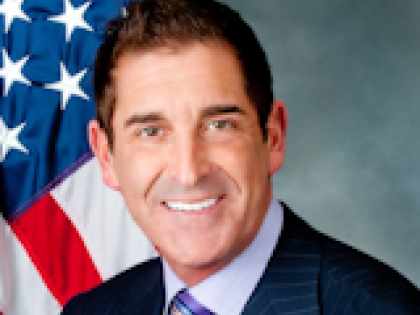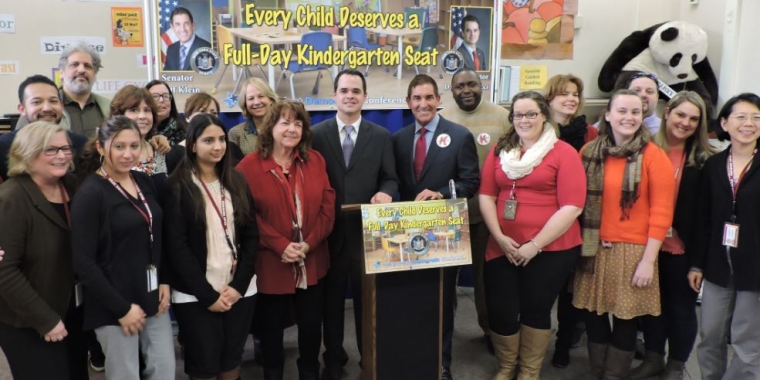
Senator Klein and IDC Release Economic Report Outlining New Evidence in Support of a Minimum Wage Increase
Jeffrey D. Klein
February 12, 2013
ALBANY, N.Y. - Building upon growing momentum in support of a minimum wage increase, the Independent Democratic Conference today released a new economic report underscoring the importance of raising the minimum wage to New York’s female and minority workforce. According to the report, New York’s low-wage women and minority workers will experience an increase in earnings by over one billion dollars if the minimum wage is increased to $8.50 or $8.75. This cross-section of low-wage workers is critical to New York’s economy since, as the report illustrates, women and minority workers make up a disproportionate number of New York’s minimum wage workers.
New York State Senate Majority Coalition Leader Senator Jeffrey D. Klein (D-Bronx/Westchester) said, “Without an increase to our state's minimum wage, hard working men and women are facing not only weakening purchasing power, but also day-to-day hardships that no number of work hours can solve. A lot of these low-wage workers are mothers and fathers who've come here to pursue the American Dream. But if these folks come here, word hard, and still can't afford to fill their family’s refrigerator, how can we hope to grow our state’s economy? When you look at the numbers--at the new spending, the new jobs, and the additional cash we would put into the pockets of hardworking men and women, it's a no brainer. After all, when these workers earn more, they’ll spend more. That's great for families, great for the local economy, and great for our state.”
As the IDC and the Economic Policy Institute detail in today’s report, increasing the state’s minimum wage would directly result in anywhere from $800-$1,000 in additional take home pay for New York’s women and minority workers--a major boost for workers who currently live in dire economic straits. The report also finds that female-dominated sectors--such as retail, food service, and home health care--are among the fastest growing sources of low-wage jobs, but only account for an average salary of $20,000 per year. Today’s report builds upon the IDC’s April 2012 report that illustrated that a minimum wage increase would generate $600 million in new in-state spending and create almost 5,000 new jobs.
Senator Malcolm Smith (D-Queens) said, “Increasing the minimum wage will not only boost our economy: it will positively contribute to the lives of underprivileged New Yorkers, most of whom are women and minority workers. The economics are simple: we cannot grow our economy while underpaying hundreds of thousands of hardworking people. That’s why I’m proud to support an increase. And why I think it’s critical for us to act on this increase this year.”
Senator Diane Savino (D-Staten Island/Brooklyn) said, “It’s long past time that we raise New York’s minimum wage. Since the last time we increased the minimum wage, the cost of living has skyrocketed, while the purchasing power of these hardworking New Yorkers has plummeted. We cannot ask New Yorkers to work for a salary that doesn’t even come close to putting food on the table. They need a raise. But an increase isn’t only the right thing to do for our workers, it’s the smart thing to do for our state’s economy. These workers are going to spend whatever increase they get, and that is exactly how we can get this economy going again.”
Senator David Carlucci (D-Rockland) said, "Raising the minimum wage for our lowest paid workers will guarantee that thousands of our hardest working men and women have a fair shot at achieving the American dream. The evidence is clear that women and minorities stand the most to gain by modestly increasing their wages to meet the new reality of today's economic climate. The experts agree that real wages will skyrocket and our economy will stand to benefit the most. I am confident that we can put the politics aside and get this done for the folks that need our assistance the most."
Senator David J. Valesky (D-Oneida) said, “Statistics like the ones presented in the report are compelling, and underscore the need for a discussion about an increase in the minimum wage. An increase, combined with continued focus on making New York more business-friendly, has the potential to benefit all New Yorkers.”
Senator Eric Adams (D-Brooklyn) said, “As of January 2013, ten states will have increased their minimum wage and numerous others are considering a variety of approaches including graduated or incremental increases with adjustments based on the consumer price index. The increases range from a low of $7.64 to a high of $9.04 per hour. Among them New York has experienced the highest cost of living increases in contrast to wages. For those who would reflect on the increase to $8.75 per hour as a disincentive to an improving economy consider that the minimum wage has increased from $1.60 in 1968 to $7.25 in 2012. One need not be an economist to recognize that the consumer price index has far exceeded the increase in wages. The Employment Law Project study tells us that were we to adjust the minimum wage to the cost of living increase, on a federal level, it would be $10.58. The Fiscal Policy Institute has declared that for New York, the enactment of this legislation will benefit 1 million workers and result in the creation 25,000 jobs, - 25,000 jobs that will add to a greater consumer base, greater profit and an increase in the tax base. For the business community, the workforce and localities this is a win, win legislation.”
Senator Adriano Espaillat said, “For low-income families in Upper Manhattan struggling to pay rent and provide for their children, an increase in the minimum wage would offer vital assistance. Minimum wage jobs remain disproportionally Black and Latino, and our community needs this increase to lift families above the poverty line that too many working people have fallen below. Raising the minimum wage would boost minority-owned small businesses in the neighborhoods I represent, and getting this done remains my top priority this session.”
Nancy Biberman, Executive Director of the Women's Housing and Economic Development Corporation said, "With so many hard working women across our state struggling to make ends meet, raising the minimum wage is one surefire way to ensure that every woman has a better chance of moving up the economic ladder. Senator Klein is right when he says that raising the minimum wage will be a job creator, not a job killer. By empowering workers to afford the day-to-day essentials, we're going to stimulate demand, increase consumer spending, and generate new jobs at New York businesses. We're proud to stand with Senator Klein and we encourage state legislators to follow suit and to pass a minimum wage increase right away."
Richard E. Barnes, Executive Director of the New York State Catholic Conference said, “The New York State Bishops strongly support an increase in the state’s minimum wage. Our sustained recession and painfully slow recovery have left many low-paid workers on the brink of homelessness, with not enough in their paychecks to pay for the most basic of necessities, like food, medicine or clothing for their children. Often minimum wage earners are single mothers, people of color and the newest immigrants to our shores with the fewest family support systems. As a matter of social justice, workers are entitled to a fair wage. It cannot be said that the current minimum wage meets that standard. We do not question the intentions of our good friends in the legislature who oppose such an increase, and it is our hope and our prayer that the two sides could come together on an agreement to address the grave problems facing the lowest wage earners in our state.
Jennifer Nelson, Executive Director of the YWCA Capital Region said, “YWCA’s across NYS often see women at the most vulnerable points in their lives. We see women who have just lost their jobs, women are recently divorced or are fleeing an abusive relationship. We see the effects of historical and ongoing low compensation for work typically performed by women and people of color. Therefore we believe that raising the minimum wage will help many of the families we serve. Raising the minimum wage will help reduce the gender wage gap and help stimulate the economy in NYS. Increasingly, women’s income makes up a larger portion of a family’s budget. Additionally, we have seen a dramatic rise in the number of families for which women are the primary bread winners. Women are responsible for making the majority of family purchases. It is most often women who buy groceries and school clothes. It is these regular and on-going purchases that keep an economy growing. Increasing the minimum wage will also allow women and people of color to build wealth by increasing their ability save and invest. Overall raising the minimum wage will help women, people of color and our economy."
-30-
Share this Article or Press Release
Newsroom
Go to NewsroomREPORT: IDC PROPOSES 50-HOUR LEARNING WEEK
February 12, 2016
Klein & Carlucci: Every child deserves a full-day kindergarten seat
February 11, 2016

SENATOR KLEIN HOSTS 21ST ANNUAL “VALENTINE’S FOR VETERANS”
February 10, 2016
